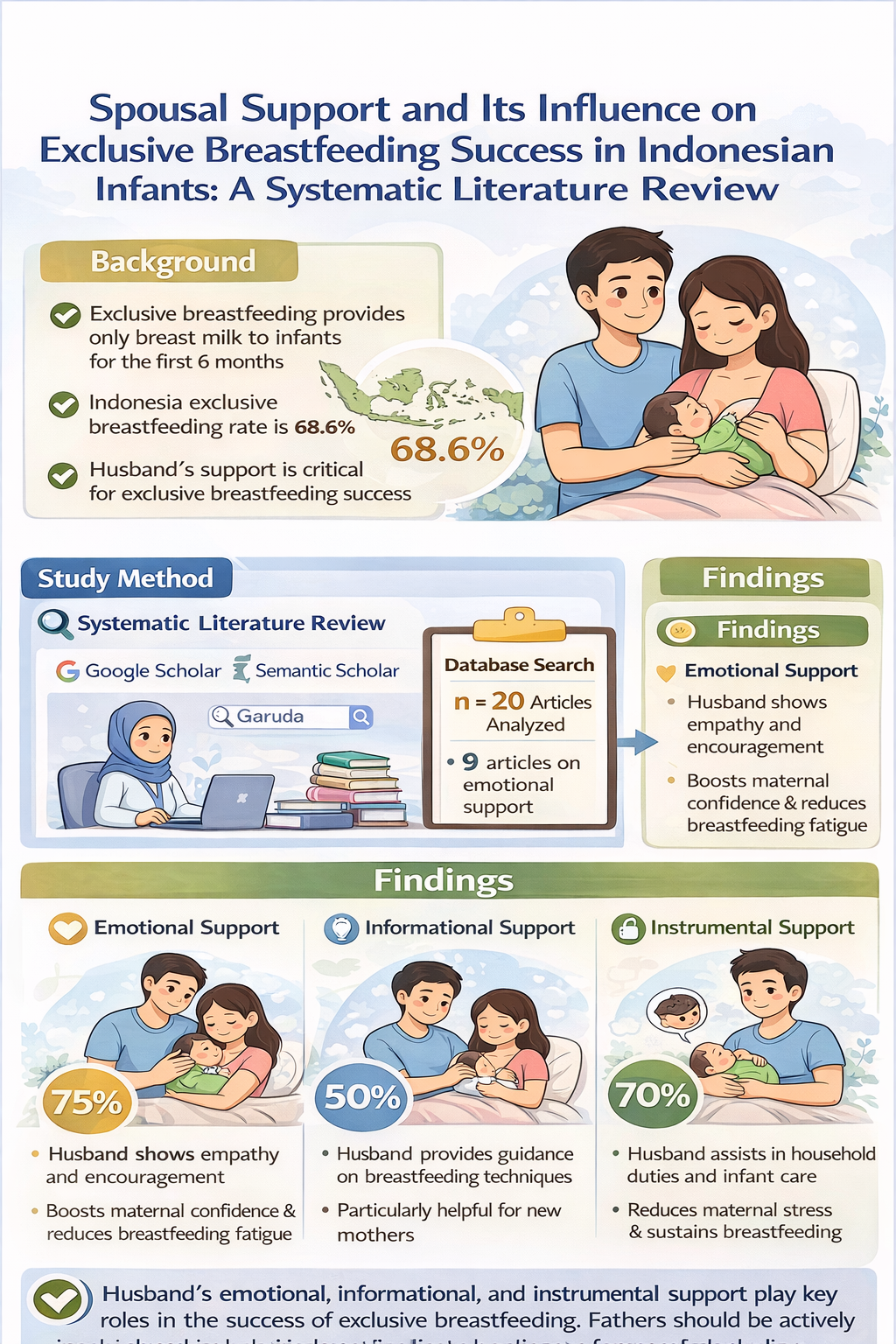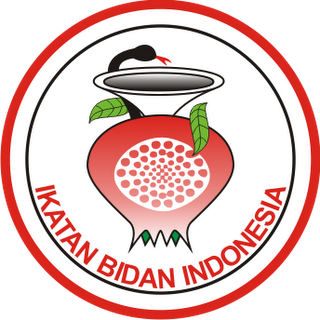Spousal Support and Its Influence on Exclusive Breastfeeding Success in Indonesian Infants: A Systematic Literature Review
https://doi.org/10.33860/jbc.v7i2.4050
Keywords:
husband’s support; exclusive breastfeeding; IndonesiaAbstract
Background: Exclusive breastfeeding involves providing only breast milk to infants from birth to six months. Globally, 48% of infants were exclusively breastfed in 2023, with Indonesia reporting 68.6% for infants aged 0-5 months. The husband's support plays a crucial role in exclusive breastfeeding success through emotional, informational, instrumental, and evaluative support which enhance maternal comfort and extend breastfeeding duration. This study investigates the impact of spousal support on exclusive breastfeeding for infants (0–6 months). Methods: A literature review was conducted with twenty articles sourced from Google Scholar, Semantic Scholar, and Garuda databases. Results: The review identified that affective support, such as empathy, motivation, and encouragement, was reported in 75% of studies and strongly correlated with maternal confidence and reduced breastfeeding fatigue. Informational support such as guidance on latching techniques or resolving milk supply issues, was present in 50% of studies and was particularly impactful for primiparous mothers. Instrumental support, found in 70% of studies, included household assistance and infant care and was associated with reduced maternal stress and sustained breastfeeding. Appraisal support was also noted but less frequently emphasized. Conclusion: Emotional, informational, and instrumental support from husbands plays a pivotal role in sustaining exclusive breastfeeding. Interventions should prioritize father-inclusive education and engagement strategies to improve breastfeeding outcomes. Policymakers and healthcare providers must actively integrate paternal support components into maternal-child health programs
Downloads
References
Afriani, Amin, W., Sabur, F., & Hariyanti. (2023). Pengetahuan dan Dukungan Suami Tentang Pemberian ASI Eksklusif di Kelurahan Cambaya Kota Makassar. Jurnal Cakrawala Ilmiah, 2(10). https://doi.org/10.53625/jcijurnalcakrawalailmiah.v2i10.5881
Atyeo, C., & Alter, G. (2021). The multifaceted roles of breast milk antibodies. Cell, 184(6), 1486–1499. https://doi.org/10.1016/j.cell.2021.02.031
A’yun, S. Q., & Yuliaswati, E. (2024). Hubungan Antara Dukungan Suami dengan Pemberian Asi Eksklusif. Observasi : Jurnal Publikasi Ilmu Psikologi, 2(4), 193–202. https://doi.org/10.61132/OBSERVASI.V2I4.714
Batlajery, J., Maryanah, Hamidah, & Nurfakrohni, F. A. (2023). Hubungan Dukungan Suami terhadap Keberhasilan Pemberian ASI Eksklusif pada Pasien Post Partum di Praktek Mandiri Bidan Sutjiati Kebunjeruk Jakarta Barat Tahun 2022. Jurnal Fisioterapi Dan Kesehatan Indonesia, 3(1). https://doi.org/10.56338/jfki.v3i1.183
Endang, Rohaya, & Afrika, E. (2023). Hubungan Dukungan Suami, Pengetahuan, dan Pekerjaan Ibu dengan Keberhasilan ASI Eksklusif (7-12 Bulan) di Puskesmas Pegayut Kecamatan Pemulutan. Jurnal Ilmiah OBSGIN, 15(4). https://doi.org/10.56338/jfki.v3i1.183
Erlidwisi, N. I., Tarigan, R. A., & Huzaima. (2024). The Relationship between Husband Support and Mother’s Employment Status with Exclusive Breastfeeding in Tanjung Buntung Community Health Center. MEDICA (International Medical Scientific Journal), 6(1). https://doi.org/10.56338/jfki.v3i1.183
Gayatri, M. (2021). Exclusive breastfeeding practice in Indonesia: a population-based study. Korean Journal of Family Medicine, 42(5), 395. https://doi.org/10.4082/kjfm.20.0131
Gunarmi, Maimunah, S., & Yulivantina, E. V. (2023). Studi Deskriptif Karakteristik Dukungan Suami dalam Pemberian ASI Eksklusif. Jurnal Kesehatan, 12(2). https://doi.org/10.37048/kesehatan.v12i2.310
Hasibuan, R., & Boangmanalu, W. (2023). Pengetahuan, Dukungan Suami, dan Peran Tenaga Kesehatan Terhadap Pemberian ASI Eksklusif. Media Informasi, 19(1). https://doi.org/10.37160/bmi.v19i1.164
unaidi, & Hadija, N. (2024). The Relationship between Mother’s Knowledge and Husband’s Support with Exclusive Breastfeeding. Jurnal Kolaboratif Sains, 7(6). https://doi.org/10.56338/jks.v4i12.2122
Kemenkes RI. (2012). Peraturan Pemerintah Republik Indonesia nomor 33 tahun 2012 tentang Pemberian Air Susu Ibu Eksklusif. Kementerian Kesehatan, Republik Indonesia.https://peraturan.bpk.go.id/Download/34987/PP%20Nomor%2033%20Tahun%202012.pdf
Laksono, A. D., Wulandari, R. D., Rohmah, N., Rukmini, R., & Tumaji, T. (2023). Regional disparities in hospital utilisation in Indonesia: a cross-sectional analysis data from the 2018 Indonesian Basic Health Survey. BMJ Open, 13(1), e064532. https://doi.org/10.1136/bmjopen-2022-064532
Likhar, A., & Patil, M. S. (2022). Importance of maternal nutrition in the first 1,000 days of life and its effects on child development: a narrative review. Cureus, 14(10). https://doi.org/10.7759/cureus.30083
Maulida, L. F., Ernita, Titisari, I., Juniarti, R. A., & Hadijah. (2024). Hubungan Paritas dan Dukungan Suami terhadap Pemberian ASI Eksklusif. Ensiklopedia of Journal, 6(4). https://doi.org/10.33559/eoj.v6i4.2497
Maulina, P., Oktalia, J., & Follona, W. (2022). The Relationship of Husband Support with Exclusive Breastfeeding. The Southeast Asian Journal of Midwifery, 8(1). http://repository.unar.ac.id/jspui/handle/123456789/1841
Meek, J. Y., Noble, L., & Breastfeeding, S. on. (2022). Policy statement: breastfeeding and the use of human milk. Pediatrics, 150(1), e2022057988. https://doi.org/10.1542/peds.2022-057988
Mohammed, S., Yakubu, I., Fuseini, A.-G., Abdulai, A.-M., & Yakubu, Y. H. (2023). Systematic review and meta-analysis of the prevalence and determinants of exclusive breastfeeding in the first six months of life in Ghana. BMC Public Health, 23(1), 920. https://doi.org/10.1186/s12889-023-15758-w
Mustary, M., Syamsul, M., Selvia, Vitarani, A., & Intang, S. N. (2022). Hubungan Dukungan Suami dalam Pemberian ASI Eksklusif di Dusun Bonti-Bonti Desa Mattoangin Bantimurung Kab.Maros. SEHATRAKYAT (Jurnal Kesehatan Masyarakat), 1(2). https://doi.org/10.54259/sehatrakyat.v1i2.921
Napitupulu, L. P., Patricia, T., & Widiarti, A. (2023). Relationship between Husband Support and Mother’s Knowledge with Exclusive Breastfeeding at Puskesmas Pahandut Palangka Raya. Barigas: Jurnal Riset Mahasiswa, 1(2). https://doi.org/10.37304/barigas.v1i2.7996
Pakilaran, G., Rasni, H., Nur, K. R. M., & Wijaya, D. (2022). Family support on exclusive breastfeeding in babies aged 0-6 months in Indonesia: Literature Review. Nursing and Health Sciences Journal (NHSJ), 2(2), 104–107. https://doi.org/10.53713/nhs.v2i2.53
Parums, D. V. (2021). Review articles, systematic reviews, meta-analysis, and the updated preferred reporting items for systematic reviews and meta-analyses (PRISMA) 2020 guidelines. Medical Science Monitor: International Medical Journal of Experimental and Clinical Research, 27, e934475-1. https://doi.org/10.12659/MSM.934475
Putri, A. O., Rahman, F., Laily, N., Rahayu, A., Noor, M. S., Yulidasari, F., Sari, A. R., Rosadi, D., Anhar, V. Y., & Wulandari, A. (2020). Air susu ibu (ASI) dan upaya keberhasilan menyusui. Banjarbaru: CV. Mine.
Santi, M., Nur, W., Widyastuti, Y., & Khasanah, F. (2023). Determinants of Exclusive Breastfeeding in Lactating Mothers in Yogyakarta, Indonesia. Open Access Macedonian Journal of Medical Sciences, 11(E). https://doi.org/10.3889/oamjms.2023.11286
Sari, Y., Kursani, E., Nurhapipa, W, S. V., & Nurlisis. (2023). Pengaruh Dukungan Suami Terhadap Pemberian ASI Eksklusif pada Ibu Menyusui di Puskesmas Selensen Kabupaten Indragiri Hilir. PREPOTIF : Jurnal Kesehatan Masyarakat, 7(3). https://doi.org/10.31965/infokes.Vol7.Iss3.1505
Silaen, R. S., Novayelinda, R., & Zukhra, R. M. (2022). Hubungan Dukungan Suami dengan Pemberian ASI Eksklusif. Journal of Holistic Nursing and Health Science, 5(1). https://doi.org/10.14710/hnhs.5.1.2022.1-10
Simanjuntak, R., Wardani, D. S., Indrawan, I. W. A., & Hinisa, F. N. (2024). Husband Support and Coping Stress on Exclusive Breastfeeding in Primipara. Jurnal Info Kesehatan, 22(2). https://doi.org/10.31965/infokes.Vol22.Iss2.1505
Sirait, N. A., Agrina, & Sari, T. H. (2022). Hubungan Dukungan Suami dan Motivasi Ibu dengan Pemberian ASI Eksklusif di Wilayah Pesisir Pekanbaru. JUKEJ: Jurnal Kesehatan Jompa, 2(2). https://doi.org/10.37304/barigas.v1i2.7996
Susilawati, Anzani, M. P., & Arifin, R. F. (2022). Husband’s Support and Mother’s Motivation with Exclusive Breastfeeding in Babies Aged 0–6 Months in Tipar Village, Sukabumi City. Risenologi, 71(1). https://doi.org/10.47028/j.risenologi.2022.71a.332
Theodorah, D. Z., & Mc’Deline, R. N. (2021). “The kind of support that matters to exclusive breastfeeding” a qualitative study. BMC Pregnancy and Childbirth, 21, 1–8. https://doi.org/10.1186/s12884-021-03590-2
WHO. (2023a). WHO Guideline for complementary feeding of infants and young children 6-23 months of age. World Health Organization. https://www.who.int/publications/i/item/9789240081864
WHO. (2023b). WHO Guideline for complementary feeding of infants and young children 6-23 months of age. World Health Organization. https://www.who.int/publications/i/item/9789240081864
Wu, Q., Tang, N., & Wacharasin, C. (2022). Factors influencing exclusive breastfeeding for 6 months postpartum: A systematic review. International Journal of Nursing Knowledge, 33(4), 290–303. https://doi.org/10.1111/2047-3095.12360
Yanhari, A. D., Kurniasari, Y., & Yugistyowati, A. (2023). The Relationship Between Family Support and Success of Exclusive Breastfeeding in Infants Aged 6-12 Months in the Working Area of Puskesmas Sewon II Yogyakarta. Journal of Global Nutrition (JGN), 3(2). https://doi.org/10.31965/infokes.Vol7.Iss3.1505
Yu, F., Liu, C., & Sharmin, S. (2022). Performance, usability, and user experience of rayyan for systematic reviews. Proceedings of the Association for Information Science and Technology, 59(1), 843–844. https://doi.org/10.1002/pra2.745

Downloads
Published
How to Cite
Issue
Section
License
Copyright (c) 2025 Septi Aruani, Diniati Sukmana, Qorinah Estiningtyas Sakilah Adnani, Hadi Susiarno, Viktor Abiola Adepoju (Author)

This work is licensed under a Creative Commons Attribution-ShareAlike 4.0 International License.
Authors who publish with Jurnal Bidan Cerdas agree to the following terms:
- Authors retain copyright and grant the journal right of first publication with the work simultaneously licensed under a Creative Commons Attribution License (CC BY-SA 4.0) that allows others to share the work with an acknowledgment of the work's authorship and initial publication in this journal.
- Authors are able to enter into separate, additional contractual arrangements for the non-exclusive distribution of the journal's published version of the work (e.g., post it to an institutional repository or publish it in a book), with an acknowledgment of its initial publication in this journal.
- Authors are permitted and encouraged to post their work online (e.g., in institutional repositories or on their website) prior to and during the submission process, as it can lead to productive exchanges, as well as earlier and greater citation of published work.

This work is licensed under a Creative Commons Attribution-Share Alike 4.0 International License
You are free to:
- Share, copy and redistribute the material in any medium or format
- Adapt, remix, transform, and build upon the material for any purpose, even commercially.
- The licensor cannot revoke these freedoms as long as you follow the license terms.




